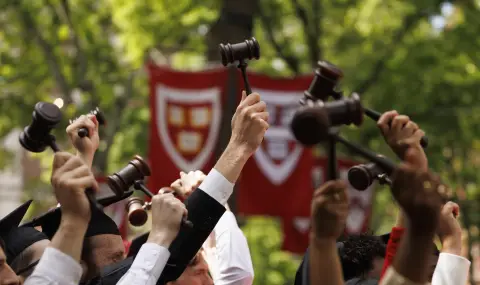The clash between the richest university and the most powerful man in the world is escalating: Harvard University remains the most prominent institution to oppose Trump.
On April 11, the Donald Trump administration sent Harvard a list of demands, including "closing all diversity, equity, and inclusion programs" and assigning a government-approved external body to conduct an audit of the views of students, faculty, and staff.
Harvard rejected Trump's demands
Some of the demands concern Harvard's work with international students. The higher education institution is asked to reform its admissions process to "prevent the admission of students who are hostile to American values." The university must also begin reporting to certain federal agencies, such as the Department of Homeland Security and the State Department, when international students commit violations.
Harvard refused, and the government quickly retaliated by freezing $2 billion in federal funding. The institution’s defiance marks a key moment in the ongoing battle between the government and private American universities. The Trump administration is seeking to establish greater ideological control over higher education.
The Trump team has cited the 2024 pro-Palestinian protests as a reason to punish universities for what it says are allowing anti-Semitism and failing to ensure the safety of Jewish students.
One group has proven particularly vulnerable to Trump’s attack on universities: international students. Many worry that the crackdown not only threatens the status of American universities as centers of academic freedom, but also as destinations for the world's best and brightest.
Land of the free? Not anymore.
DW spoke to a foreign student at Washington's private American University, who requested anonymity because he fears his visa will be revoked. The student believes that the attack on universities is aimed at ending the practice of free debate and the free exchange of ideas.
"I am a freshman who came to the United States for new opportunities and challenges that do not threaten my personal freedoms, including free thought. I thought I was in the so-called "Land of the Free", he says.
A journalism student has to self-censor himself after receiving a letter from his university warning him not to criticize the policies of the Trump administration. "It's not safe to be a journalist in (my country). Now I feel safer there than in the US. It's hard to put into words," he says.
Fear of Travel and Border Crossing
It's not just international students who are being restricted in their freedom of expression. Rohan Kapoor, vice president of the International Students Association at George Washington University in the capital, told DW that many foreign students are afraid to travel freely for fear of having their visas revoked: "I know that many foreign students will not go home this summer, but will stay here, simply because they don't want to take the risk."
On March 27, Secretary of State Marco Rubio was asked how many student visas the government had revoked in the course of the crackdown, especially against pro-Palestinian protesters. "Maybe more than 300 so far. We do it every day, every time I find one of these crazy people," he replied.
The issue of revoking student visas is also being monitored by NAFSA, a Washington-based nonprofit organization focused on international education and exchange. Between mid-March and mid-April, nearly 1,300 foreign students and scholars had their visas revoked or were removed from SEVIS, the government’s database of nonimmigrant and exchange students.
"There is no transparency about the reasons for these revocations or the charges against the students," the organization notes on its website.
The risks, however, are not limited to visa revocations. There have already been several cases of foreign students being detained. Among them is Mahmoud Khalil, a student activist at Columbia University who organizes pro-Palestinian demonstrations. The same fate befell Rumeysa Öztürk, a doctoral student at Tufts University, who was detained by Immigration and Customs Enforcement (ICE) agents for criticizing the university's response to human rights violations in Gaza in her student newspaper.
"They want to control how we think"
The Trump administration's crackdown on universities has also raised concerns outside the academic community. Former Democratic congressman Jamal Bowman, who supported the student protest in Washington on April 4, told DW that the Trump administration's treatment of education and academics appears to be part of a broader political strategy.
"The less educated people are, the more they can be controlled," says Bowman. "The Trump administration and the "Project 2025" initiative ... want to control what we read, how we think, how we organize, because it gives them more power and takes it away from us."
When DW asked the White House to respond to Bowman's accusations, the press service reminded us with a relevant photo of an incident in which the former congressman set off a fire alarm before a bill was voted on. When asked again, they replied, "Bowman is not a serious person. He doesn't deserve a serious answer."
Bowman encourages students to take to the streets and hold those in power accountable: "We need our young people to organize across the country," the Democrat said. "We're seeing young people being taken right off the streets and disappeared just because they're exercising their First Amendment rights. This is unacceptable. And we need to fight back with every cell in our bodies, because our democracy and our humanity are under attack."
Author: Olivia Gilliand
